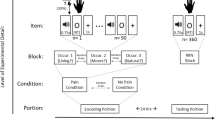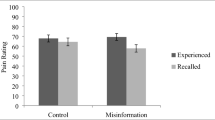Abstract
Memory is a key cognitive variable in pain management, but lacks extensive research. This study is a replication and extension of Seltzer and Yarczower’s (1) investigation of pain’s influence on memory for affective words, which found fewer positive words and more negative words recalled if subjects were in acute pain (versus no pain). In the present study, two experiments were conducted: one with a recall memory test and one with a recognition memory test. One hundred sixty undergraduate subjects were randomly placed in one of four groups: two groups had the same condition (pain or no pain) for both the encoding task and memory test, and two groups had mixed conditions (pain at encoding-no pain at memory test or no pain at encoding-pain at memory test). Pain was induced by 0°–2°C water immersion. At encoding, subjects categorized words by judging them as either positive or negative. Results of both experiments show that pain impairs memory. In neither experiment were differences found on memory for positive and negative words. These results do not support Seltzer and Yarczower’s discriminative effects of pain on word category, but they are consistent with other research using acute pain manipulations and chronic pain populations, suggesting that pain interferes with memory. It is hypothesized that pain depletes scarce attentional resources, thereby interfering with concurrent cognitive tasks such as thinking, reasoning, and remembering.
Similar content being viewed by others
References
Seltzer SF, Yarczower M: Selective encoding and retrieval of affective words during exposure to aversive stimulation.Pain. 1991,47:47–51.
Fordyce WE (ed):Back Pain in the Workplace: Management of Disability in Nonspecific Conditions. Seattle, WA: International Association for the Study of Pain Press, 1995.
Erskine A, Morley S, Pearce S: Memory for pain: A review.Pain. 1990,41:255–265.
Pearce SA, Isherwood S, Hrouda D, et al: Memory and pain: Tests of mood congruity and state dependent learning in experimentally induced and clinical pain.Pain. 1990,43:187–193.
Turner J: Environmental influences on pain states: A forum for psychosocial pain researchers. American Pain Society, 15th Annual Scientific Meeting. Washington, DC: 1996.
Livengood JM, Schnurr RF, Porzelius J: Effects of memory impairment on treatment of chronic pain. American Pain Society, 14th Annual Scientific Meeting. Los Angeles, CA: 1995.
Bower GH, Gilligan SG, Monteiro KP: Selectivity of learning caused by affective states.Journal of Experimental Psychology (General). 1981,110:451–473.
Clark WC, Bennett-Clark S: Remembrance of pains past?.Journal of the American Pain Society. 1993,2:195–200.
Hyde TS, Jenkins JJ: Recall for words as a function of semantic, graphic, syntactic orienting tasks.Journal of Verbal Learning and Verbal Behavior. 1973,12:471–480.
Craik FIM, Lockhart RS: Levels of processing: A framework for memory research.Journal of Verbal Learning and Verbal Behavior. 1972,11:671–684.
Turk DC, Meichenbaum D, Genest M:Pain and Behavioral Medicine: A Cognitive-Behavioral Perspective. New York: Guilford Press, 1983, 353–355.
Williams DA, Thorn BE: Can research methodology affect treatment outcome? A comparison of two cold pressor methodologies.Cognitive Therapy and Research. 1986,10(5):539–546.
Anderson NH: Likableness ratings of 555 personality-trait words.Journal of Personality and Social Psychology. 1968,9(3):272–279.
Jensen MP, Karoly P, Braver S: The measurement of clinical pain intensity: A comparison of six methods.Pain. 1986,27:117–126.
Jensen MP, Turner JA, Romano JM: Self-efficacy and outcome expectancies: Relationship to chronic pain coping strategies and adjustment.Pain. 1991,44:263–269.
Kupers RC, Konings H, Adriaensen H, Gybels JM: Morphine differentially affects the sensory and affective pain ratings in neurogenic and idiopathic forms of pain.Pain. 1991,47:5–12.
Rohlf JF, Sokal RR:Statistical Tables (2nd Ed.). New York: W. H. Freeman & Company, 1981, xi-xiii; 80–81.
Snodgrass JG, Corwin JC: Pragmatics of measuring recognition memory: Applications to dementia and amnesia.Journal of Experimental Psychology (General). 1988,117:34–50.
Salovey P, Smith AF, Turk DC, Jobe JB, Willis GB: The accuracy of memory for pain. Not so bad most of the time.Journal of the American Pain Society. 1993,2:184–191.
Johnston WA, Greenberg SH, Fisher RP, Martin DW: Divided attention: A vehicle for monitoring memory processes.Journal of Experimental Psychology. 1970,83:164–171.
Walker J: Pain and distraction in athletes and non-athletes.Perceptual and Motor Skills. 1971,33:1187–1190.
Eccleston C: The attentional control of pain: Methodological and theoretical concerns.Pain. 1995,63:3–10.
Author information
Authors and Affiliations
Additional information
The authors appreciate the assistance of Dr. Crawford Clark and Dr. Mark Yarczower who read and commented on earlier versions of this manuscript. The authors acknowledge Dr. Suzanne Seltzer’s reading of a draft of this manuscript.
About this article
Cite this article
Kuhajda, M.C., Thorn, B.E. & Klinger, M.R. The effect of pain on memory for affective words. ann. behav. med. 20, 31–35 (1998). https://doi.org/10.1007/BF02893806
Issue Date:
DOI: https://doi.org/10.1007/BF02893806




